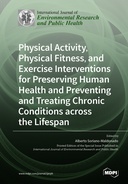Explore

Physical Activity, Physical Fitness, and Exercise Interventions for Preserving Human Health and Preventing and Treating Chronic Conditions across the Lifespan
0 Ungluers have
Faved this Work
Login to Fave
Increasing global physical activity levels is one of the most important public health goals of the 21st century. Physically active individuals present better sleep patterns, increased wellbeing and quality of life, as well as better physical function and fitness levels. In addition, physical activity might stimulate brain function and improve both cognition and mental health. The risk of many chronic diseases is also reduced in physically active individuals, and physical activity might counteract the detrimental metabolic effects of long sedentary periods. Physical fitness is not only a key marker of health in healthy individuals, but in people with chronic conditions. Compelling evidence indicates that low levels of both cardiorespiratory fitness and muscular strength are associated with an increased risk of morbidity and premature mortality for a variety of causes, including cardiovascular diseases and cancer. Consequently, preserving fitness levels throughout life is a major clinical and public health interest. Exercise interventions represent the most efficient form of physical activity to enhance physical fitness and improve health outcomes at all ages and chronic statuses. However, exercise prescription in many populations is underdeveloped and further insights are needed for practitioners and the research community to understand how exercise should be administered, depending on the health and clinical status of different populations. This Special Issue focuses on the influence of fitness and physical activity and the effects of exercise interventions on human health- and disease-related outcomes. This includes, but is not restricted to, the following article types: Observational studies assessing the association of physical fitness (alone or in combination with other risks/protective factors) with health- and disease-related outcomes. Observational studies assessing the association of physical activity (alone or in combination with other lifestyle behaviors) with health- and disease-related outcomes. This includes studies assessing physical activity through either objective or subjective means. Experimental studies assessing the effects of exercise interventions (alone or in combination with other interventions) on health- and disease-related outcomes across the lifespan. Systematic reviews and meta-analyses on the above-mentioned topics are also welcome.
This book is included in DOAB.
Why read this book? Have your say.
You must be logged in to comment.
Rights Information
Are you the author or publisher of this work? If so, you can claim it as yours by registering as an Unglue.it rights holder.Downloads
This work has been downloaded 105 times via unglue.it ebook links.
- 105 - pdf (CC BY) at Unglue.it.
Keywords
- African circle dance
- Aging
- Anxiety
- autoimmune disease
- Autonomic Nervous System
- body mass index
- Cancer
- cardiac rehabilitation
- Cardiovascular Disease
- Cardiovascular Diseases
- cardiovascular risk
- chronic low back pain
- Clinical Trial
- Cognition
- construct validity
- core muscles
- depressive symptoms
- dynamometer
- event-related potential
- executive control
- Exercise
- Exercise therapy
- Fatigue
- fitness
- health-related physical fitness
- high intensity training
- Humanities
- Inflammation
- Internally displaced persons
- lupus
- Martial arts
- Mental health
- Meta-analysis
- Metabolism
- Muscle strength
- Obesity
- overweight
- peak torque
- physical aptitude
- physical fitness
- QoL
- Reference Data
- rheumatic disease
- Risk factors
- schoolchildren
- Smoking
- Social interaction
- Social issues & processes
- Society & culture: general
- Society & Social Sciences
- Stress
- systematic review
- thema EDItEUR::J Society and Social Sciences::JB Society and culture: general::JBF Social and ethical issues
- thema EDItEUR::N History and Archaeology::NH History
- trunk strength testing
- university staff
- weight gain
Links
DOI: 10.3390/books978-3-0365-2501-3Editions

